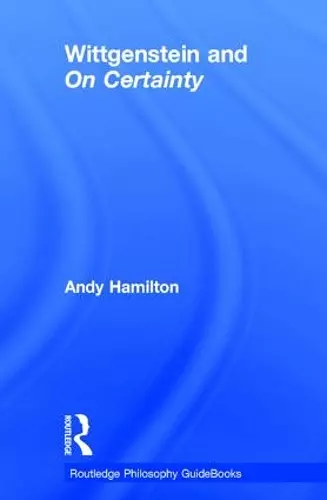Routledge Philosophy GuideBook to Wittgenstein and On Certainty
Format:Hardback
Publisher:Taylor & Francis Ltd
Published:25th Nov '14
Currently unavailable, and unfortunately no date known when it will be back
This hardback is available in another edition too:
- Paperback£31.99(9780415450768)

Ludwig Wittgenstein is arguably the most important philosopher of the twentieth century. In On Certainty he discusses central issues in epistemology, including the nature of knowledge and scepticism. The Routledge Philosophy Guidebook to Wittgenstein and On Certainty introduces and assesses:
- Wittgenstein's career and the background to his later philosophy
- the central ideas and text of On Certainty, including its responses to G.E. Moore and discussion of fundamental issues in the theory of knowledge
- Wittgenstein's continuing importance in contemporary philosophy.
This GuideBook is essential reading for all students of Wittgenstein, and for those studying epistemology and philosophy of language. On Certainty, Wittgenstein's final work, addresses a category of "world-picture" propositions discovered by G.E. Moore. These challenge Wittgenstein's enduring commitment to a well-defined category of empirical propositions, and help to generate a critique of scepticism. Developing Wittgenstein's view that scepticism is self-undermining, the Guidebook offers a combative yet therapeutic interpretation that locates On Certainty between the standpoints of Kant and Hume.
'This unique and highly readable introduction sets Wittgenstein’s late text in its historical context and emphasises enduring themes running through his later philosophy. Using recent work on On Certainty, Hamilton provides his reader with a clear exposition of the work’s major themes, facilitating further engagement.' – Bernhard Weiss, University of Cape Town, South Africa
'Wittgenstein wrote, "Philosophy is not a body of doctrine but an activity… [of] clarification". He shows us paths from metaphysical abstraction to the more habitable, yet largely unrecognised, world of our everyday lives. But how does this therapeutic conception infuse the enigmatic epistemological writings known as On Certainty? As a guide, Hamilton is precisely the sort of reader Wittgenstein would have wanted, one fully engaged in thinking with, and against, the text. Hamilton’s Wittgenstein is a humanist who rejects the current orthodoxy that models philosophy on the natural sciences. By demonstrating the power of the text to stimulate his own thoughts, Hamilton encourages us to think with the text ourselves.' - David Macarthur, Sydney University, Australia
ISBN: 9780415450751
Dimensions: unknown
Weight: 453g
340 pages